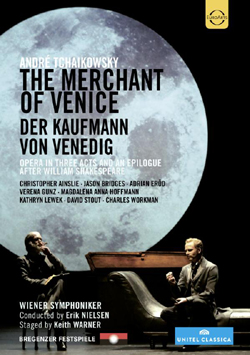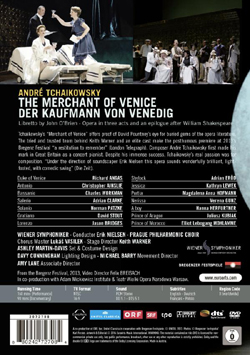|
Click Any
Image
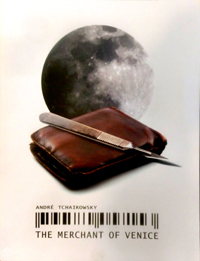
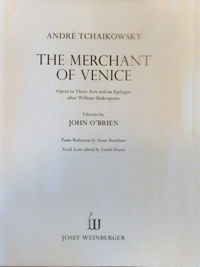
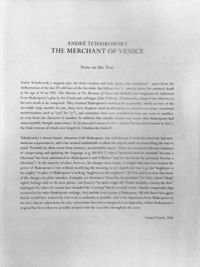
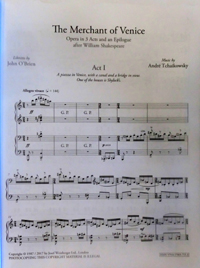
Vocal
Score (400 pages)
Piano Reduction - Susan
Bradshaw
Editor - Lionel Friend
Publisher - J.
Weinberger
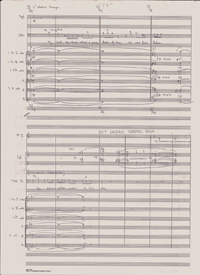
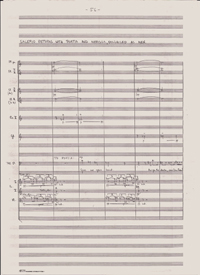
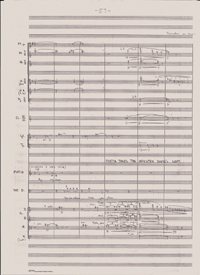
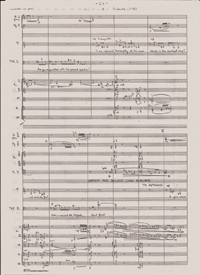
Typical Manuscript Pages
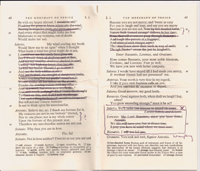
Working on the libretto -
Click Here for a
PDF file of O'Brien's original libretto
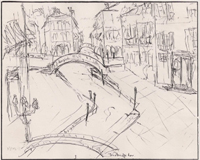
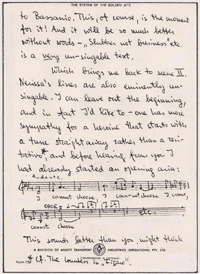
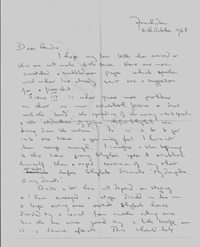
Letters between André and John O'Brien (see below)
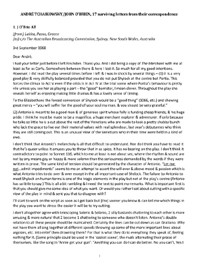
Conductor
Lionel Friend collected all the known letters between André Tchaikowsky
and librettist John O'Brien. For a PDf file (Click
Here).
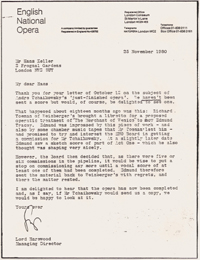
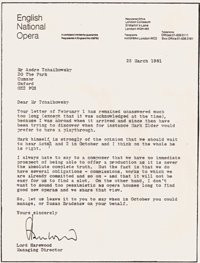
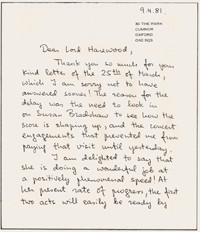
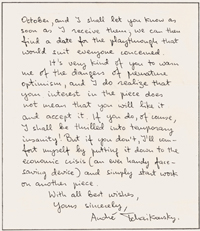
Opera Correspondence with Lord Harewood
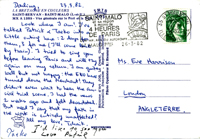
Postcard to Eve Harrison (March 23, 1982)
André
writes in part: "I am quite well, but not happy: the ENO have turned
down the Merchant! They didn't even wait to hear the crucial trial scene.
I had the news 2 weeks ago and felt devastated. But need I say that
my faith in the work is entirely unaffected?
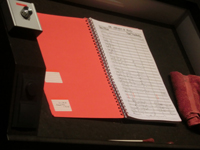
Conductor's Score (2013)
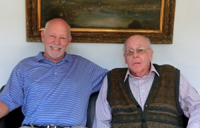
David A. Ferré (left) and
John O'Brien (opera librettist)
(July 2013)
John O'Brien (1937-2017)
Link,
remembering John
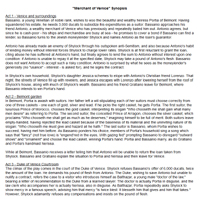
"Merchant
of Venice" Synopsis
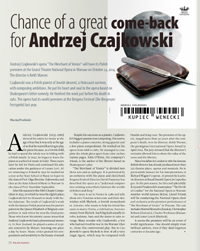
Article by Maciej Prolinski
World Market magazine
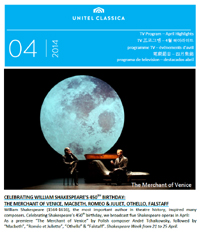
Cover from the April 2014
schedule for Unitel Classica broadcasts (PDF
File)
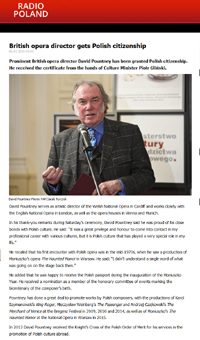
David Pountne
gains Polish Citizenship (2019)
|
Opera
Premiere wins 1st place for The International Opera Awards 2014
Stunning news that The Merchant of Venice has won the best Opera "World
Premiere" of 2013 in the April 2014 awards ceremony. This news
also appears on Polish website (Click
Here for Polish; Click
Here for English), as well as newspapers in Poland (Click
Here) and many others worldwide.
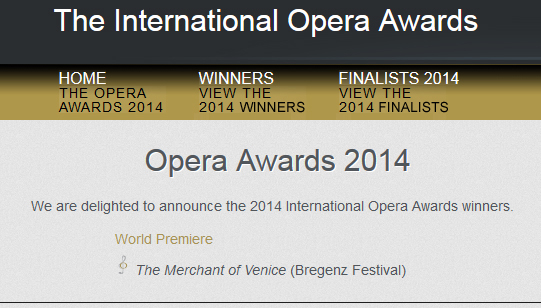
Opera Samples
and Links
The following opera samples and links are from the 2013 Bregenz, Austria
production.
|
Subject
|
Source
|
Note
|
To
View
|
| Opera
Act 1 (complete) |
YouTube |
From
Rehearsal |
Click
Here |
| Opera
Act 2 (complete) |
YouTube |
From
Rehearsal |
Click
Here |
| Opera
Act 3 (complete) |
YouTube |
From
Premiere (TV) |
Click
Here |
| Opera
Epilogue (complete) |
YouTube
|
From
Premiere (TV) |
Click
Here |
| "The
Merchant" (trailer) |
Vimeo |
In
English |
Click
Here |
| "The
Other Tchaikowsky" (trailer) |
Vimeo |
In
English |
Click
Here |
| "The
Other Tchaikowsky" (sample) |
Vimeo |
Password
is "andre" |
Click
Here |
| Journey
To Bregenz (sample) |
Vimeo |
Password
is "andre" |
Click
Here |
EuroArts
announces the opera on DVD/Blu-ray Discs
EuroArts, a leading producer of high-definition DVD and Blu-ray discs,
has announced the release of The Merchant of Venice on video discs.
Offered on their own website, and others such as Amazon.com, you can
view the Bregenz performance of the opera in stunning detail and superior
audio. Click
Here to learn more about EuroArts and Click
Here for the EuroArts YouTube program about the opera. For ordering
information from EuroArts, Click
Here. Note this offering also includes a 50-minute documentary about
the making of the opera.
DVD
Version (2 discs)
Item No: 2072708
EAN No: 0880242727084
Blu-ray
Version (1 disc)
Item No: 2072704
EAN No: 0880242727046
|
DVD/Blu-ray
Reviews
|
| Classical-Music.com
[BBC] (April 2015) - Click
Here (in English) |
| Pizzicato
Online, Remy Franck (January 2015) - Click
Here (in German) |
| HDVD
Arts, Henry McFadyen Jr.(January 2015) - Click
Here (in English) [scroll to view] |
| Opera
News, David Shengold (December 2014) -
Click Here (in English) |
| The
Guardian, Tim Ashley (December 2014) - Click
Here (in English) |
| Gramophone,
Mike Ashman (November 2014) - Click
Here (in English) |
| Music
Web International, Stephen Greenbank (November 2014) - Click
Here (in English) |
| Theater
Byte (October 2014) - Click
Here (in English) |
| Online
Merker website (October 2014) - Click
Here (in German) |
| Other
Voices via Scribd website (October 2014) - Click
Here (in Spanish) (PDF only) |
| L'Avant-Scène
Opéra website (October 2014) - Click
Here (in French) |
| Wholenote
website (September 2014) - Click
Here (in English) |
Culturalmente
Incorrecto website (September 2014) - Click
Here (in Spanish)
|
| Brattleboro
Reformer Newspaper, Vermont, USA (August 1914) - Click
Here (in English) |
Full
Opera Scores from publisher Josef Weinberger
Publisher
Josef Weinberger may be contacted for those interested in detailed
study of the opera, available as full scores in four volumes. A Vocal
Score, edited by Lionel Friend, is also available from Weinberger..
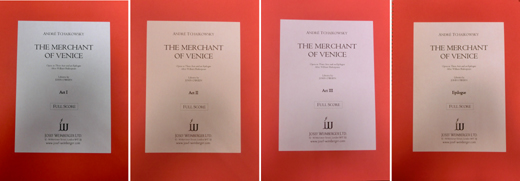
This
work is
published by Josef
Weinberger and appears in their catalog of André Tchaikowsky
published works. Click Here
for a PDF copy of the André Tchaikowsky Josef Weinberger catalog.
John
O'Brien (1937 - 2017) - Librettist
John O’Brien was born in Johannesburg, Republic of South Africa,
in 1937, into a religious family dedicated to helping the plight of
blacks living within a society that eventually codified Apartheid as
official policy. The family, working within the Anglican Church for
the rights of blacks, became activists and a frequent visitor and house
guest was a South African Anglican cleric and theologian known for his
work as an anti-apartheid and human rights activist, Desmond Tutu (Nobel
Peace Prize 1984, Bishop of Johannesburg 1985 to 1986, Archbishop of
Cape Town 1986 to 1996). (Click
Here to read the CV John wrote himself in 1986 at the request of
the webmaster, as a PDF file.) Click
Here to hear John talk about the libretto.
From 1963
to 1973, John was on staff at Finchden
Manor, Tenterden, Kent, UK, a community for delinquent, disturbed
or disturbing boys who were at risk, and who were having trouble entering
society in a safe and welcoming manner. George
Lyward (1894-1973), a charismatic British educationist and psychotherapist,
founded and led Finchden Manor from 1935 until his death in 1973. O’Brien
was hired to direct and stage theatrical productions, and to introduce
unruly boys into the world of the theatrical arts. It was into this
setting that a troubled boy, frequently depressed, fighting thoughts
of suicide, lost in many ways, came to visit Finchden. It was André
Tchaikowsky.
When John
O'Brien was presenting a theatrical production at Finchden Manor, André
would always attend. In the Spring of 1968, John produced Shakespeare's
"The Tempest." André and John had long talks about
Shakespeare, and then André had an idea. John O'Brien:
In 1968
I produced Shakespeare's The Tempest at Finchden. It was out
of that starting point that André and I got going on opera.
He had wanted to write an ode to music and to use the beautiful dialog
in Act V of the Merchant of Venice.
Then came the suggestion: 'Why don't we try an entire opera, the entire
Merchant of Venice?' I think it must have occurred to him that
it would, as an opera, give him an opportunity to look at a whole
lot of fairly crucial things in his life.
With John
returning to South Africa in 1973, to eventually become a staff member
at the Maru-a-Pula
(Clouds of Rain) secondary school in Gaborone, Botswana, work on the
opera libretto was conducted by correspondence. Click
Here for a summary of this correspondence, which was researched
and assembled by conductor Lionel
Friend. Click
Here for a tribute to John O'Brien from the Maru-a-Pula website.
Click Here for John
O'Brien's voice telling about how the opera came about.
With George
Lyward’s death in 1973, and the permanent closing of Finchden Manor,
John mused about André's future:
Lyward's
dying in a sense was a challenge to André. You know, 'You've
now had all you can of me -- the next bid is yours.' I think André
did very consciously think that way. It was a crucial turning point.
André was now on his own.
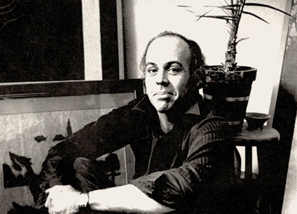
John O'Brien at Finchden Manor (c. 1965) |
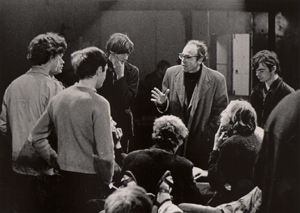
John
O'Brien at Finchden Manor (c. 1965)
|
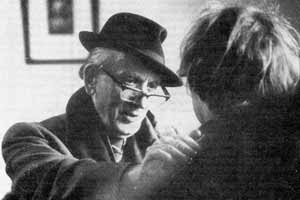
George Lyward (1894-1973) |
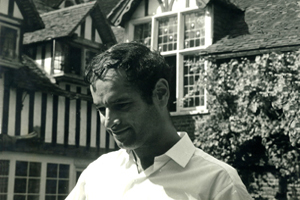
André Tchaikowsky at Finchden (1964) |
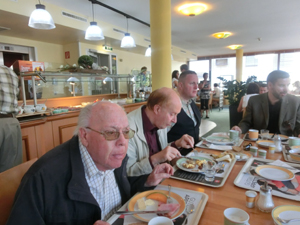
Breakfast table in Bregenz, Austria (2013)
(l to r) John O'Brien (Librettist), Christopher
Seaman (Conductor), Lewis Mitchell (Weinberger), Chris Moss
(Weinberger) |
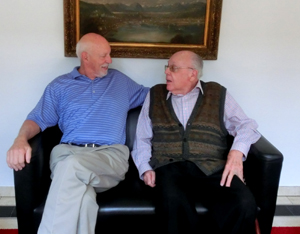
David Ferré (Webmaster) and John O'Brien (Librettist) at
a Bregenz, Austria hotel. While in Bregenz, Dave was the driver
for John O'Brien who needed a cane for support |
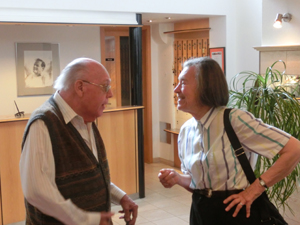
John O'Brien meets an old friend, Judy
Arnold, after almost 40 years absence. John and Judy would
attend concerts together in London in the 1960s and 1970s |
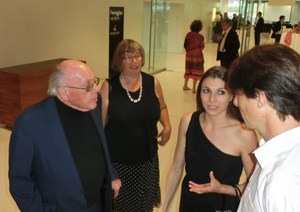
(l to r) John O'Brien (Librettist), Kathleen Childs Ferré
(Webmaster's wife), Dr
Anastasia Belina (Musicologist, writer), Seán
Gray (Managing Director, Weinberger) |
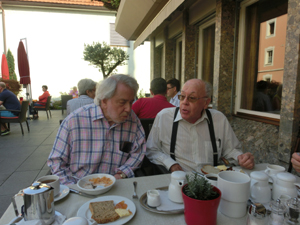
(l to r) Gerald Kingsley (Weinberger, retired) and John O'Brien
(Librettist). Kingsley is also a pianist and former student of
Swiss pianist, Edwin Fischer |
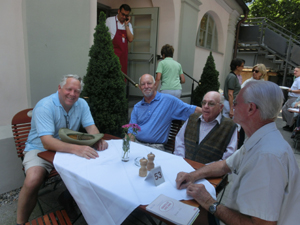
(l to r) Andy
Taylor (Maru-a-Pula principal), David Ferré (Webmaster),
John O'Brien (Librettist), David Slater (Friend from Botswana)
|
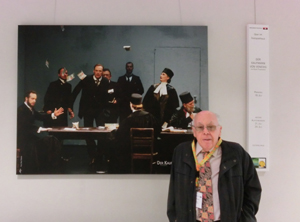
John O'Brien (Librettist) standing in front of an opera scene
photograph
|
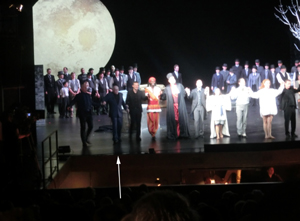
John O'Brien (arrow) takes a bow after the opera premiere, July
18, 2013 |
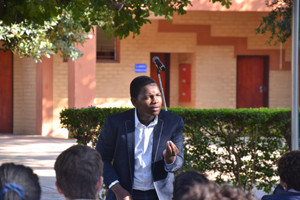
Memorial Service - Reading from The Merchant of Venice
|
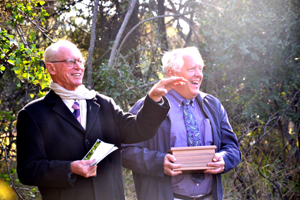 Memorial
Service -David Slater (l) and Andy Taylor (r) with John's ashes
Memorial
Service -David Slater (l) and Andy Taylor (r) with John's ashes
|
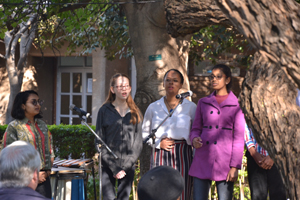
Memorial Service - Music under the direction of Laone Thekiso
|
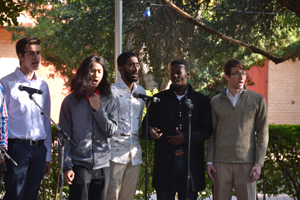
Memorial Service - Music under the direction of Laone Thekiso
|
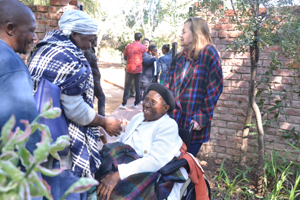
Memorial Service - Special guest, Sethokgo Sechele or simply Mma
Sechele |
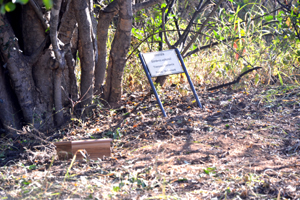
Memorial Service - Gardenia tree much loved by John O'Brien |
"A
Study in Contrast"
The
July 10, 1992 program about André Tchaikowsky, "A Study
in Contrast," included this segment about the opera. Use the player
below or select this mp3 link: contrast_opera.mp3.
For the entire program, A Study in Contrast, see the Miscellaneous
link above. Voices for the following: John Schofield, Susan Bradshaw,
David Owen Norris, Terry Harrison.
Music/MP3
There is a demonstration recording of the opera "Epilogue"
that was paid for by funds given to André while he was ill. This
dates from 1992. The demonstration recording features Terry Edwards
and the London Voices, and pianist Susan Bradshaw, who also did the
opera piano reduction:
"The
Merchant of Venice" Epilogue / opera_epilogue_demo.mp3
From
the biography The
Other Tchaikowsky
André
labored for 24 years on his opera "The Merchant of Venice."
Except for a few pages of orchestration, the work was complete at his
death. It was completed and published, in both full score and piano
reduction, using the memorial fund established by his friends and literary
executors.
The opera
is written in three acts and Epilogue, based on the Shakespeare play.
The forces for the 2-1/2 hour opera are:
Cast:
Jessica - High Soprano
Portia - Mezzo- Dramatic Soprano
Nerissa - Mezzo-Soprano
Antonio - Counter-Tenor
Bassanio - Tenor
Lorenzo - Lyric Tenor
Shylock - Baritone
Salerio - Baritone
Solanio - Bass
Gratiano - Bass
Duke of Venice - Baritone
Orchestra:
Augmented Full Orchestra
Stage
Band:
Lute
Two Recorders
Oboe d’Amore
Oboe da Cacce
Two Bassoons
Harpsichord
The two
musicians most closely familiar with the opera, Susan Bradshaw and Hans
Keller, praised this major composition of André's artistic maturity.
Susan Bradshaw wrote to Eve Harrison on July 30, 1984:
Dear
Eve,
Having
just finished making the vocal score of André Tchaikowsky's
opera, "The Merchant of Venice," I thought I must write
and tell you what an outstanding work I feel it to be, particularly
in the way it manages to communicate all the passionate involvement
that went into its composition. There is a wealth of striking detail
here, both musical and dramatic (in the glittering orchestration as
well as on stage) and the vocal lines, though not always easy, are
intensely singable throughout. I am confident that the work will one
day be given the full stage production it undoubtedly deserves as
a significant contribution to the modern operatic repertoire (and
one with a good chance of appealing to the opera-going public); meanwhile,
wouldn't it be wonderful if we could manage to arrange a concert performance,
to whet the appetite, so to speak
With
Best Wishes,
Susan
Bradshaw
Hans Keller
wrote his opinion of the opera, also in July 1984:
I am
intimately acquainted with André Tchaikowsky's opera, "The
Merchant of Venice," and have no hesitation in describing it
as an outstanding work, both musically and theatrically. For those
of us who knew André Tchaikowsky's previous compositions, the
considerable musical substance and weight of the work did not come
as a surprise; but that a composer, however inventive, should write
his first opera as if he had developed his sense for the theatre over
many years is surely a surprising fact which one could almost honour
with the adjective "sensational."
There
are many successful operas which aren't half as stage-worthy as is
Tchaikowsky's opera; what is even more striking is that every crucial
dramatic corner is supported by music which would retain its fascination
if one had no idea of the dramatic situation to which it applied.
Needless to add, I would be able and prepared to substantiate this
considered opinion in detail, on the basis of the score. Meanwhile,
let it be said that, although the composer's style is very eclectic,
there isn't a phrase, not a harmony, in the entire score which doesn't
disclose his clearly and well defined creative personality.
John O'Brien
wrote the libretto for André's opera, The Merchant of Venice.
When John O'Brien was presenting a theatrical production at Finchden
Manor, André would always attend. In the Spring of 1968, John
produced Shakespeare's "The Tempest." André and John
had long talks about Shakespeare, and then André had an idea.
John O'Brien:
"In
1968 I produced Shakespeare's 'The Tempest' at Finchden. It was out
of that starting point that André and I got going on opera.
He had wanted to write an ode to music and to use the beautiful dialog
in Act V of the Merchant of Venice. After all the horrors of the trial
scene and Shylock, it all reverts back to Belmont, and Shylock's daughter
is left in charge of the house with her young lover. They're out in
the moonlight, there's a house band playing off stage and they're
expecting Portia to return after the trials. Lorenzo silences her
to listen to the music and to talk about his fears, about what music
can actually do, how it can charm animals and even tame the human
spirit in a man who has no music in him.
"That
obviously appealed to André. He liked that as something to
set to music and asked me if perhaps I'd help him with it. I think
in part he had got the idea because he had heard Benjamin Britten's
'Midsummer Nights Dream.'
"We
talked a long time on the great lawn at Finchden in front of the house,
an old Elizabethan, Jacobian house, with huge cedar trees. We discussed
the 'Tempest' and my interpretation of it. Then came the suggestion.
It was all very lighthearted at first. Quite soon after that, he said,
'Why don't we try an entire opera, the entire 'Merchant of Venice?'
I think it must have occurred to him that it would, as an opera, give
him an opportunity to look at a whole lot of fairly crucial things
in his life. At first it seemed odd, that he, a Jew, would want to
take Shylock on, particularly at a time when there was a feeling that
Shakespeare was anti- Semitic, which is a nonsensical thing anyway.
There was the portrayal of some anti-Jewish feeling, yes, but that's
not the same as anti-Semitism. This was really the starting point
of the opera."
André
was certainly aware that Ralph Vaughan Williams wrote his "Serenade
to Music" (1938) based on text from Act V of the "Merchant
of Venice."
John O'Brien
began writing the libretto for the "Merchant of Venice" immediately
after his conversation with André, but following André's
instructions that there was an "infinity of time," he initially
made little progress. Soon, André left for Australia for his
extended tour. Letters flew back and forth between John and André
as the libretto started to take form. John enclosed a few pages from
the play with markings to indicate which passages would be included
in the opera and which would be deleted. One letter included a sketch
of the stage for the Venice portion. After working for several months,
John wrote to André on November 17, 1968, when John was vacationing
on the Greek island of Paxos:
Dear
André,
I began
last evening to read through "The Merchant" again. I read
and re-read and crossed out here and abbreviated there until I felt
I had come up against the real questions: What is an opera? What is
a libretto?
John had
plenty of ideas for the opera, as did André. When André
returned from his tour of Australia and Japan, they had long discussions
about the libretto. The breakthrough came in the summer of 1970 when
John and André were vacationing on Corsica:
"Once
we established the dramatic shift to make all the Venice scenes into
one single act, to drive that section hard and fast, there was little
need for serious disagreement. Ultimately the composer tells you what
he can put to music. André was himself very sensitive to literature.
I felt no need to fight with Shakespeare's words for goodness sakes.
Shakespeare's play was there. What counted was finding just enough
words to convey a drama structurally. What was difficult for me early
on was to abandon the drama of language and the music of the language,
and say, 'That's got to go,' because that's what the music is going
to do. Shakespeare's verse is marvelous to speak, but almost impossible
to sing interestingly."
André
approved of the approach of having the heroine enter 45 minutes after
Act 1 started, of having a bridge with the Jews on one side and Gentiles
on the other, with all action taking place on the bridge itself, and
of having each act start and end with a single person on stage. The
libretto was completed in just three weeks. But much time would elapse
before the music was forthcoming.
In August
1972, having made progress with the opera, André wrote to John
O’Brien:
Dear
John,
I've
just shown "The Merchant" to Hans [Keller], and he expressed
astonishment at both the quantity and quality of what has come along
since he last saw the sketch six weeks ago! I'm so excited I certainly
couldn't have resisted ringing you up immediately if I had known where
you are. [John was visiting his mother in South Africa.] However,
I've come across my first dramatic problem (I won't bother you with
the musical ones, which are numerous but soluble) and I hope you'll
agree to help me with it.
He then
continued into questions of the dramatic structure of the libretto.
By the
summer of 1978, André had put to paper about two-thirds of the
opera. The rest was swimming around in his head. André's technique
was to write first an abbreviated orchestral version and then a full
orchestral version. John O'Brien had sent the final libretto to André
on July 10, 1978. He now had no excuse not to proceed with the opera,
but estimated it would take about another three years. To John O'Brien,
André wrote on July 11, 1978:
Dear
John,
Thank
you so much for the libretto! And how thoughtful of you to have made
a photocopy at the same time -- both arrived safely this morning.
I'm going to London tomorrow, so I'll drop it at my publishers.
Do you
know Christopher Hampton's play, "Total Eclipse?" It's about
Rimbaud's affair with Verlaine and the spiritual crisis that made
Rimbaud give up writing at 19. It was played at the Royal Court in
London ten years ago, but I only know it from a radio production,
which left a lasting impression. Well, very recently I got it out
of the library (it's out of print) and was utterly overwhelmed. Weeping
over it seemed a poor response, and anyway I wanted to live with the
play; so I wrote the author and asked his permission to base an opera
on it! Yesterday I received his reply: "By all means." So
now you know who your successor will be.
But don't
worry: of course I won't start on it till I've finished "The
Merchant" as best I can. At any rate, you'll admit that I am
in no danger of repeating myself! Surely the challenge of portraying
Rimbaud should alone prove enough to prevent my settling down into
a competent middle-aged complacency.
I'll
let you know the English National Opera's reaction to the libretto!
This is all they can see at the moment: if they knew the work is nearly
two-thirds finished, they wouldn't bother to commission it! I wonder
how long it will take them to make up their minds.
Your
old
André
It must
have been at least a little surprising to O'Brien that André
was ready to begin another opera with "The Merchant" still
well short of completion, and it was characteristic of André
to present this idea in the least welcome way to its recipient. Later,
André sent a copy of "Total Eclipse" to O'Brien and
suggested he write the libretto, but John refused.
Then on
October 1, 1980, he wrote to Michael Menaugh:
Dear
Michael,
Rejoice
with me -- I have finished "The Merchant of Venice!" It
took Hans to convince me that I really had. I kept fussing and fiddling
with it, changing tiny details that I would then change back to their
previous version, merely because I couldn't adjust to the new situation.
Hans then offered to write to Lord Harewood, who is chairman of the
ENO [English National Opera], on my behalf. I doubt whether his recommendation
can override the English economic crisis, but it is good to see him
so impressed.
Yours,
André
An opera
playthrough was scheduled for December 21, 1981. In
attendance for the December 21 playthrough was the director of the English
National Opera, Lord Harewood, orchestra director Mark Elder, chorus-master
Hazel Vivienne, David Pountney, a staff pianist and André (André
was the "orchestra" and the staff pianist the "voices").
The ENO was very pleased that André himself would play one of
the piano parts. Elder remembers:
"André's
opera play through was unusual because usually when we play an opera
through like this, we use our own staff of pianists and singers, and
try to figure things out. But in this case, the composer was there
to play the piano and explain the opera. It helped a great deal. I
can tell you, it was like a concerto -- such playing! Wonderful. I
thought the words and music fit together very well. It was beautiful.
I'm not sure if he wrote other operas, but we get so many operas,
there are many, many to choose from in England. We are booked for
years in advance."
After the
ENO play through, André didn't know what to think. Was the ENO
interested? Was there a chance his opera might actually be performed?
André was upbeat when he wrote on December 26 to John O'Brien,
who had visited André earlier in the year in Cumnor:
Dear
John,
You're
CRAZY! I don't know what telephone calls to Gaborone may have cost,
but wouldn't come to anything like £100. I am accepting your
cheque as a loan, to be repaid when you come back to see "The
Merchant."
Don't
conclude from the latter part of this last sentence that the audition
has produced tangible immediate results: they were extremely friendly
and obviously interested, but careful not to say anything that could
be used in evidence against them! They didn't even say anything like
"we'll be in touch" or "we'll let you know": that
had to be inferred from the mere fact of its being, after all, an
audition. The interest showed in their insistence on hearing everything
that could be played, even the easier fragments of the last two scenes
that had not been part of the agreed schedule; in their extremely
specific and practical questions, to which my answers were taken down
in writing; in their timing Act II while I played (exactly 45 minutes).
They were behaving as if the opera had already been accepted and they
were planning the programme.
But that,
of course, may be their usual way of conducting auditions. For three
hours, they gave me their entire attention; then Lord Harewood suddenly
said: "Well, this was very interesting, thank you very much,"
and within a minute or so the room was empty. It was like falling
into an air pocket! But the chorus-master, a marvelous woman named
Hazel Vivienne, who had asked some very shrewd questions and at one
point made me correct the prosody, joined me a moment later in the
canteen to say: "I'd get cracking on the rest and finish it as
soon as possible and then we'd have another play through. It might
be as well to play the first two acts again, people forget."
So here was one member of the jury who indicated that she, at any
rate, would like to see the piece get through.
I told
Hans what I've just told you and he offered to ask Lord Harewood how
the audition went! As you know, it was Hans who had originated the
whole thing with the ENO, so his interest is very natural and Lord
Harewood may be willing to tell him something; with me, all he did
was ask questions. Meanwhile, I'll follow Hazel's advice -- I've already
done three more pages since the audition, even though the strain of
the preparation and the emotional disorientation that followed the
experience resulted in an illness that I'm just beginning to recover
from. That sudden dismissal, without the least hint of any further
contact, after three hours of close collaboration that had made me
feel "part of the family," was the closest equivalent of
prick-teasing I've ever experienced, and in a field that matters somewhat
more to me than my prick.
Fortunately,
I was too stunned to produce anything except stale clichés
(Merry Christmas, Nicetohavemetyou) which, I am sure, was exactly
what the situation demanded of me. I still think they could have said
something like, "Don't expect to hear anything for at least two
months" without it committing them to anything like a favourable
answer; but no, they acted as if they had all got together and concentrated
so hard on my music out of sheer idle curiosity. Don't you sometimes
marvel at the English?
Still,
all the people familiar with the procedure (Terry, Chris Seaman) assure
me that this is how such things are done, and Hans said it sounds
very auspicious! For my part, I have liked them so much that if a
cable arrived from the Met offering a premiere and a fortune, I'd
still wait for the ENO decision first. We lovers are prone to such
crushes.
Ever
your old,
André
André
wrote a similar letter to Ian Dando, saying, "Susan's piano reduction
makes that of Wozzeck look like chopsticks, and I worked like a maniac
trying to get my fingers round as many notes as I could." He added
that he had had to playa recital on short notice: "I had to rush
out and replace Cristina Ortiz, who had canceled a recital in order
to breast-feed her new baby! I had no such excuse, and I owe Terry too
much money to be able to refuse any opportunity he puts my way for repaying
him."
With the
Christmas of 1981 upon him, André conveyed to Ian Dando his real
opinion of the holiday season in a letter of December 12:
Then
there was the pressure of Christmas. Ian, dare I confess to you that
I detest Christmas? It means nothing to me: I have no religious associations,
no family bonds, no childhood memories, nothing that would give it
any meaning, and my reluctant annual attempt to go through the motions
is sheer hypocrisy. I do try to play the game, and every year I dutifully
go through my address book and send cards in alphabetical order, to
all the people who are likely to embarrass me by sending me one if
I've forgotten them (the best line of attack is defense); but I do
it with increasing resentment, and by the time I've reached R or S,
I find myself wishing for the sudden death of each successive recipient
(it is lucky you are under D). And every year the list gets longer,
the pressure heavier, the fatigue more intense.
Ian,
can we please call the Xmas game off? I hate insulting my real friends
by putting them on the same list as my doctor and bank manager, and
I only sent you a present because you forced my hand by sending me
one. This is why it is late, and I'm afraid I lied to you when I said
I couldn't get it earlier. If you want me to have a present, send
me one for my birthday and let me know the date of your own. Sorry
to sound ungrateful -- I'm writing this with your warm comfortable
slippers on my feet -- but surely you'd be more touched if I remembered
your own birthday rather than Jesus'?
Ever
André
A letter
from the English National Opera dated March 25, 1982, from the managing
director, Lord Harewood, included the following (remembering that the
December 1981 playthrough did not include acts 1 and 2):
Dear
Mr. Tchaikowsky,
Your
letter of February 1 has remained unanswered much too long (except
that it was acknowledged at the time), because I was abroad when it
arrived and since then have been trying to discover when for instance
Mark Elder would prefer to have a playthrough.
Mark
himself is strongly of the opinion that we should wait to hear Acts
1 and 2 in October [1982] and I think on the whole he is right.
I always
hate to say to a composer that we have no immediate prospects of being
able to offer a production as it is never the absolute complete truth.
But the fact is that we do have several obligations - commissions,
works to which we are already committed and so on - and that it will
not be easy for us to find a slot. On the other hand, I don't want
to sound too pessimistic as opera houses long to find good new operas
and we share that view.
Yours
sincerely,
Lord Harewood
André
responded to Lord Harewood's letter with:
Dear
Lord Harewood,
Thank
you so much for your kind letter of the 25th of March [1982], which
I am sorry not to have answered sooner! The reason for the delay was
the need to look in on Susan Bradshaw to see how the score is shaping
up, and the concert engagements that prevented me from paying that
visit until yesterday.
I am
delighted to say that she is doing a wonderful job at a positively
phenomenal speed! At her present rate of progress, the first two acts
will easily be ready by October [1982], and I shall let you know as
soon as I receive them; we can then find a date for the playthrough
that would suit everyone concerned.
It's
very kind of you to warn me of the dangers of premature optimism,
and I do realize that your interest in the piece does not mean that
you will like it and accept it. If you do, of course, I shall be thrilled
into temporary insanity! But if you don't, I'll comfort myself by
putting it down to the economic crisis (an ever handy facesaving device)
and simply start work on another piece.
With
all best wishes,
Yours sincerely,
André Tchaikowsky
The playthrough
in October, 1982, did not happen, of course, as André died in
June. To the everlasting credit of Susan Bradshaw, even after André's
death she continued to make the piano reduction of the opera knowing
that payment would probably be unlikely, and completed the task to everyone's
satisfaction. In the end, she did receive partial payment but considerably
less than promised.
|

























